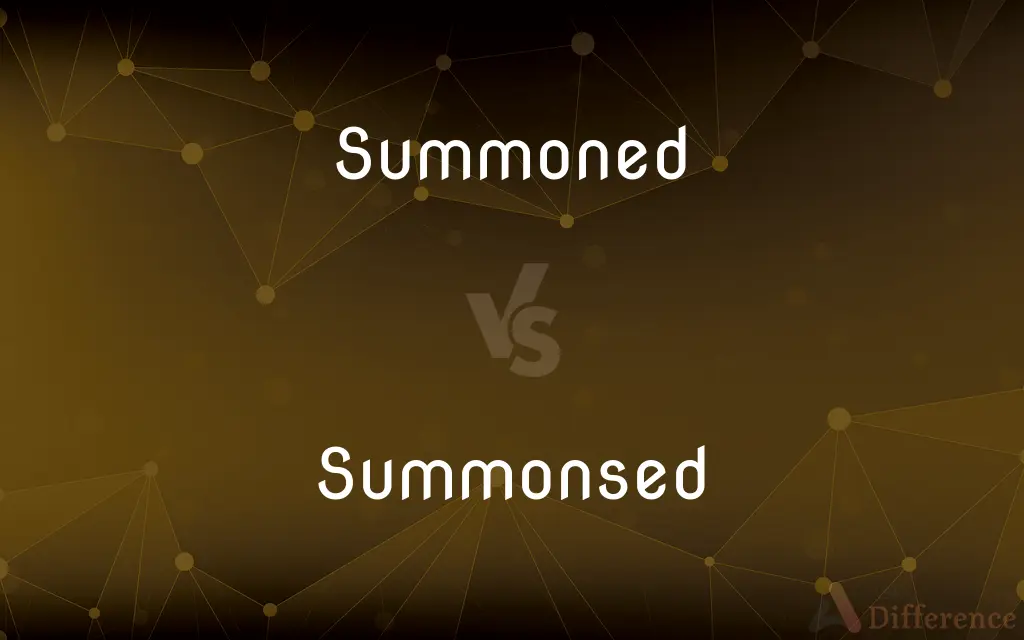Summoned vs. Summonsed — What's the Difference?
By Urooj Arif & Fiza Rafique — Updated on March 13, 2024
Summoned refers to being called or ordered to appear, while summonsed is less commonly used but means receiving a formal notice to appear in court.

Difference Between Summoned and Summonsed
Table of Contents
ADVERTISEMENT
Key Differences
Summoned is primarily used to describe the act of calling someone or something to appear, often by authority or magic. It can apply to various contexts, from legal to mystical. On the other hand, summonsed specifically refers to the process of being served with a summons, which is a legal document ordering an individual to appear in court.
While "summoned" has a broader application, including being called to a meeting, to assist, or even in a metaphorical sense like summoning strength, "summonsed" is strictly legal. The term "summonsed" directly relates to the formal notice given to a person that they must appear in court on a specific date and time.
The usage of "summoned" is far more common in everyday language, encompassing a wide range of scenarios beyond the legal field. "Summonsed," however, is a term you might encounter predominantly in legal documents or contexts, emphasizing the formal requirement to appear before a court.
Grammatically, "summoned" is the past tense of the verb "to summon," indicating an action that has already occurred. "Summonsed" also serves as a past tense but specifically derives from the noun "summons," which has been verbified to describe the action of issuing a summons.
The choice between "summoned" and "summonsed" thus depends on the context. For general purposes of indicating that someone was called upon, "summoned" is appropriate. However, if referring specifically to the legal action of being ordered to court, "summonsed" is the technically correct term, though "summoned" is often used in this context as well due to its broader acceptance and use.
ADVERTISEMENT
Comparison Chart
Definition
Called or ordered to appear
Issued a formal notice to appear in court
Usage
Broad, including legal and non-legal contexts
Primarily in legal contexts
Commonality
More commonly used
Less commonly used
Verb Form
Past tense of "to summon"
Past tense form derived from "summons"
Contextual Scope
Wide range of scenarios
Specifically legal scenarios
Compare with Definitions
Summoned
Called to attend a meeting.
She was summoned to the principal's office.
Summonsed
Issued a legal notice to appear in court.
He was summonsed to testify in the lawsuit.
Summoned
Requested to provide assistance.
Volunteers were summoned during the crisis.
Summonsed
Received a formal court order.
The defendant was summonsed for a preliminary hearing.
Summoned
Invoked magical entities.
The wizard summoned a phoenix from the ashes.
Summonsed
Obligated to respond to a legal document.
The company was summonsed over regulatory violations.
Summoned
Ordered to appear in court.
The witness was summoned for the trial.
Summonsed
Notified by a legal authority.
She was summonsed for jury duty.
Summoned
Called upon inner strength.
He summoned the courage to face his fears.
Summonsed
Called to court as part of legal proceedings.
Witnesses were summonsed as part of the evidence-gathering process.
Summoned
To call together; convene
Summon a meeting of officials.
Summonsed
A call by an authority to appear, come, or do something.
Summoned
To request to appear; send for
Summon a doctor to help an injured man.
Summonsed
An order or process directing a person, especially a defendant in a case, to appear in court.
Summoned
To order to take a specified action; bid
Summon the captain to surrender.
Summonsed
An order or process directing a person to report to court as a potential juror.
Summoned
To bring to mind or remember. Often used with up
We tried to summon up an image of our childhood friend.
Summonsed
To order to appear in or report to court by means of a summons
The defendant was summonsed to the district court.
Summoned
To cause one to think of (something); evoke. Often used with up:"Badly cured hippie fur ... maté, and paraffin heating oil are the scents that summon up my remembrance of the late sixties" (Judith Thurman).
Summonsed
To serve with a summons.
Summoned
To bring into existence or readiness. Often used with up:"He summoned up a smile, though it seemed to take all his strength" (Colin Turnbull).
Summonsed
Simple past tense and past participle of summons
Summoned
Simple past tense and past participle of summon
Common Curiosities
Can "summoned" be used in non-legal contexts?
Yes, "summoned" can be used in a variety of contexts, not limited to legal scenarios.
What is being summonsed?
Being summonsed refers to receiving a formal legal notice to appear in court.
Are "summoned" and "summonsed" interchangeable?
While they can be used interchangeably in legal contexts, "summoned" is more versatile and widely accepted.
What is the origin of "summoned"?
"Summoned" comes from the verb "to summon," which has roots in calling or ordering someone to appear.
What does it mean to be summoned?
Being summoned means being called or ordered to appear, often by authority.
Is "summonsed" commonly used outside of legal documents?
No, "summonsed" is primarily used in legal contexts and documents.
How does one get summonsed?
One gets summonsed through the issuance of a legal document called a summons, requiring court appearance.
What happens in court after being summonsed?
After being summonsed, you may need to testify, present evidence, or respond to charges in court.
Can a company be summonsed?
Yes, companies can be summonsed to appear in court or respond to legal actions.
Can I ignore a summons?
Ignoring a summons can lead to legal consequences, including warrants for arrest or default judgments.
Is being summoned the same as being arrested?
No, being summoned involves being ordered to appear in court, whereas being arrested involves custody by law enforcement.
What should I do if I'm summonsed?
If you're summonsed, it's important to respond appropriately and consider seeking legal advice.
Does being summoned imply wrongdoing?
Being summoned does not inherently imply wrongdoing; it means you're required to appear or respond.
Can I be summoned by email?
Legal summoning methods vary by jurisdiction, but traditionally, summonses are served in person or by mail.
Share Your Discovery

Previous Comparison
Confident vs. Confidence
Next Comparison
Tattooist vs. TattooerAuthor Spotlight
Written by
Urooj ArifUrooj is a skilled content writer at Ask Difference, known for her exceptional ability to simplify complex topics into engaging and informative content. With a passion for research and a flair for clear, concise writing, she consistently delivers articles that resonate with our diverse audience.
Co-written by
Fiza RafiqueFiza Rafique is a skilled content writer at AskDifference.com, where she meticulously refines and enhances written pieces. Drawing from her vast editorial expertise, Fiza ensures clarity, accuracy, and precision in every article. Passionate about language, she continually seeks to elevate the quality of content for readers worldwide.















































